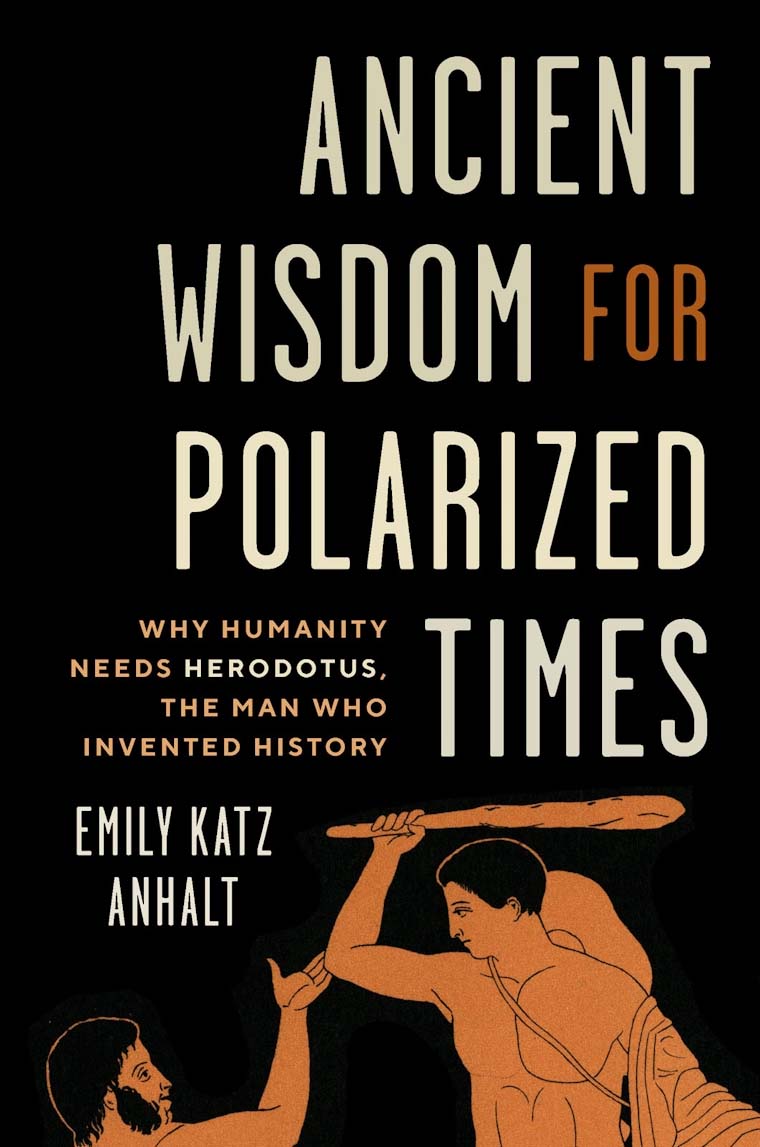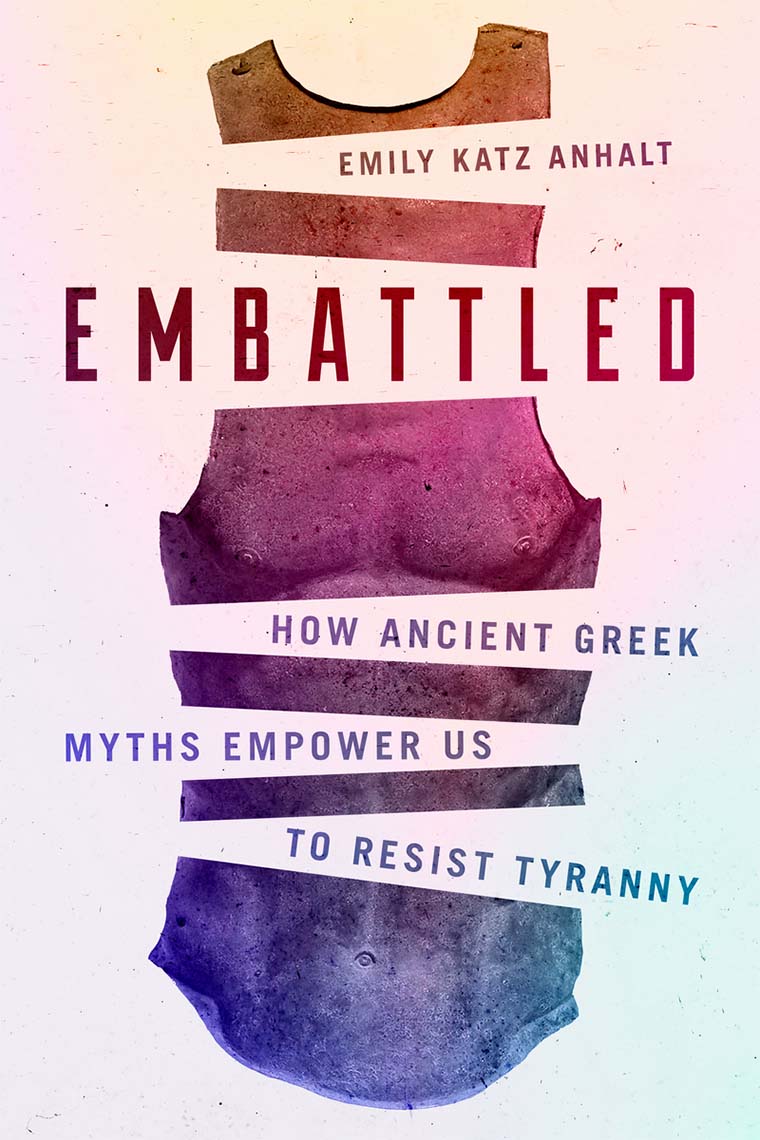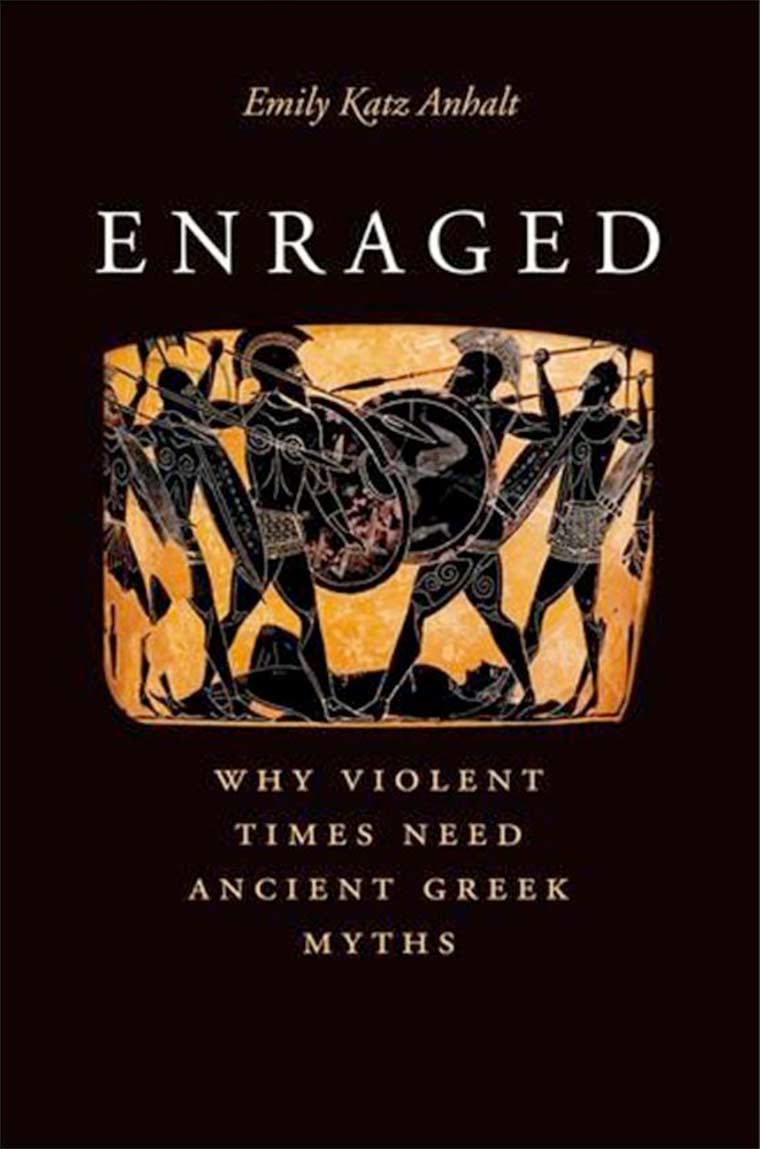AB, Dartmouth College. PhD, Yale University. Primary interests are Greek epic and lyric poetry, Greek historiography, Greek tragedy, and Greek and Roman sexuality. Publications include: Ancient Wisdom for Polarized Times: Why Humanity Needs Herodotus, the Man Who Invented History (Yale University Press, 2025), Embattled: How Ancient Greek Myths Empower Us to Resist Tyranny (Stanford University Press, 2021), Enraged: Why Violent Times Need Ancient Greek Myths (Yale University Press, 2017), Solon the Singer: Politics and Poetics (Lanham, MD, 1993), as well as several articles on the poetics of metaphor in Homer and on narrative techniques in Herodotus. SLC, 2004–
Undergraduate Courses 2025-2026
Literature
First-Year Studies: Rejecting Tyranny: Ancient Greek Origins of Democratic Ideals
First-Year Studies—Year
LITR 1100
Where and how did democratic ideals emerge? Throughout the history of the world, hierarchies of power and privilege have predominated. Democracy is not the norm. Democracy is the bizarre exception. But 3,000 years ago, ancient Greek epic poetry began to undermine the moral validity of political hierarchies and tyrannical abuses of power. From the eighth through the fifth centuries BCE, ancient Greek literature cultivated ideals of humanity, equality, and justice vital to sustaining humane, egalitarian values, norms, and institutions. Over centuries, ancient Greeks came to understand—as by now we must—that not only individuals but also groups, both large and small, can wield power tyrannically by using violence and intimidation to subjugate others and silence dissenting opinions. Reading selected works of Homer, Aeschylus, Sophocles, Herodotus, Euripides, Plato, and others, we will investigate how and why the Greeks developed democratic ideals, why they themselves failed to attain them, and how we might do better. This course is reading- and writing-intensive. We will also encounter ideas that are uncomfortable and troubling in various predictable and unpredictable ways. The course is designed for anyone who welcomes open-minded critical inquiry and is eager to read and calmly discuss texts that are challenging, both intellectually and emotionally. In fall, students will meet weekly with the instructor for individual conferences; in spring, individual conferences will be biweekly.
Faculty
Latin
Intermediate Latin: From Republic to Autocracy
Intermediate, Seminar—Year
LATN 3510
Prerequisite: two semesters of Beginning Latin (LATN 3001) or equivalent
In this course, students will develop their comprehension of Latin grammar, vocabulary, word inflection patterns, and syntax by close reading of selected works of Catullus and Cicero in fall and Ovid and Livy in spring. The ancient Roman Republic lasted 450 years before imploding into a military dictatorship. The democratic republic in the United States, modeled on the ancient Roman Republic, has lasted just 237 years and now confronts forces threatening to replace it with dictatorship or some form of authoritarian populism. Examining works of poetry and prose, both accompanying and following the advent of autocracy in ancient Rome, we will consider the value and limits of literature for exposing, challenging, or affirming hierarchical and tyrannical ideals, institutions, and norms.
Faculty
Greek (Ancient)
Beginning Greek
Open, Seminar—Year
GREE 3001
This course will provide an intensive introduction to Ancient Greek grammar, syntax, and vocabulary, with the aim of reading the language as soon as possible. By fall mid-semester, students will be reading authentic excerpts of Ancient Greek poetry and prose. Students will also read and discuss English translations of selected works of Plato, Aristophanes, Thucydides, and Pseudo-Xenophon. In spring, while continuing to refine their knowledge of Greek grammar and their reading skills, students will read extended selections of Plato’s Apology in the original Greek. Biweekly individual conferences with the instructor, in addition to class sessions, will be required.
Faculty
Previous Courses
Latin
Beginning Latin
Open, Seminar—Year
This course provides an intensive introduction to Latin grammar, syntax, and vocabulary, with a view toward reading the language as soon as possible. Close reading of Vergil’s Aeneid in English will accompany intensive language study in the fall. By midsemester, students will be translating authentic excerpts of Latin poetry and prose. During the spring semester, while continuing to develop and refine their knowledge of Latin grammar and vocabulary, students will read selections from Vergil’s Aeneid in Latin.
Faculty
- Emily Anhalt
- Emily Fairey
Beginning Latin and registration interview with the instructor
Open, Seminar—Year
LATN 3001
This course provides an intensive introduction to Latin grammar, syntax, and vocabulary, with a view to reading the language as soon as possible. Close reading of Vergil’s Aeneid in English translation will accompany intensive language study in the fall. By mid-semester, students will be reading authentic excerpts of Latin poetry and prose. During the spring semester, while continuing to develop and refine their knowledge of Latin grammar and vocabulary, students will read selections of Vergil’s Aeneid in Latin. The course is rigorous and time-consuming. Class meets three times per week; individual conferences meet once every two weeks; and students are expected to spend a minimum of two hours/day, 6 days/week, preparing for classes and conferences. If you enjoy the challenges and satisfactions of hard work (and have good tolerance for frustration), you will find Latin fun and extremely rewarding.
Faculty
Intermediate Latin
Intermediate, Seminar—Year
See the full description under Literature: Can This Republic Be Saved? Cautionary Evidence From Ancient Rome. Intermediate Latin students will complete the reading assignments for the literature course and attend all literature seminar meetings. In place of an independent conference project, Intermediate Latin students will read selected works in Latin and attend twice-weekly Latin group conferences.
Faculty
Readings in Intermediate Latin
Intermediate, Seminar—Year
See the full description under Literature: Can This Republic Be Saved? Cautionary Evidence From Ancient Rome. Students will be exempt from the literature seminars and some reading and writing assignments but must attend the twice-weekly Latin group conferences.
Faculty
Literature
Can This Republic Be Saved? Cautionary Evidence From Ancient Rome
Open, Seminar—Year
The democratic republic in the United States was modeled on the Roman Republic, for good and ill, and has lasted just 234 years. Our democratic republic is now under siege, both figuratively and literally, by forces threatening to replace it with a dictatorship or some form of authoritarian populism. The ancient Roman Republic lasted 450 years before imploding into a military dictatorship. The Roman experience shows that the introduction or reintroduction of violence into the political process—even if the aim is social justice—absolutely precludes any possibility of equity or justice. Since the collapse of the Roman Republic, history has shown repeatedly that political violence, if condoned and unchecked, inevitably produces not social justice but the atrocities and devastations of fascism or totalitarianism. This course will examine this and other lessons from ancient Roman literature and history that are vital for us today if we hope to survive and thrive as individuals, as members of various communities, and as a species. We will read (in English translation) and discuss selected works by Catullus, Cicero, Sallust, Appian, Plutarch, Horace, Livy, Ovid, and Cassius Dio.
Faculty
First-Year Studies: Reality Check: Homer, Herodotus, and the Invention of History
First-Year Studies—Year
Reality is currently under siege. Millions of people today believe, to their core, things that are demonstrably not true. Are we “each entitled to our own reality,” as some would argue? The ancient Greeks thought otherwise. Some 2,500 years ago, the Greeks began to distinguish muthos (origin of the English word “myth”)—an unverified, unverifiable story—from historiē (origin of the English word “history”), an inquiry into the facts for the purpose of making a rational assessment. Simultaneously, the Ancient Greeks began to reject tyranny and introduce democratic political ideals and institutions. Tyrants, however, require obedient subjects unwilling or unable to fact-check even their most preposterous lies. Today’s autocrats and would-be autocrats bombard us with fictions, even contradictory fictions, so as to eradicate the very concept of objective fact. As individuals, we are losing the ability to assess facts on their merits. We’re losing the ability to learn not only from history but even from our own experience. Succumbing to authoritative speakers, many of us prefer virtue-signaling to real-world problem solving. We’re abandoning verbal persuasion in favor of violence and intimidation. Can democratic ideals and institutions survive if we can no longer distinguish myth from history, fiction from fact? What is the value of evidence-based, logical reasoning? How can we learn from fiction without being deceived by it? Reading and discussing Homer’s Iliad and Odyssey (c. 8th cent. BCE) and Herodotus’s Histories (c. 440s, 430s BCE), we will examine these and other questions that are as vital to human survival and success today as they were centuries ago. This course is designed for students who welcome open-minded critical inquiry and are eager to read texts that are challenging both intellectually and emotionally. During the fall semester, students will meet with the instructor weekly for individual conferences. In the spring, we will meet weekly or every other week, depending on students’ needs and the progress of their conference projects.
Faculty
What Should I Do? Democracy, Justice, and Humanity in Ancient Greek Tragedy
Open, Seminar—Year
LITR 3085
Are human beings capable of self-government? What does that require? As modern authoritarian movements imperil democratic institutions, norms, and the rule of law, ancient Greek tragedies illuminate values and aspirations underpinning democracy and modern liberal ideals of justice, equality, and universal human rights. Tragedy and democracy emerged simultaneously in ancient Athens in the late 6th century BCE and flourished throughout the 5th century BCE. Ancient Greece never achieved egalitarian politics or anything close to universal human rights, but Athenian tragedies emphasize the essential equality of all human beings in our vulnerability to suffering and death. Surviving plays of Aeschylus, Sophocles, and Euripides dramatize the costs of tyranny, anger, vengeance, and cruelty—to perpetrators, as well as to victims. Commending honesty, generosity, and compassion, tragedies locate nobility not in genetic inheritance, group affiliation, socioeconomic status, numerical superiority, or even moral or ideological convictions but, rather, in our conduct as individuals. Tragedies expose the consequences of human words and actions, as characters make choices conducive to success or failure for themselves and their communities. State-sponsored and publicly performed, tragedies made self-reflection and self-criticism a fundamental feature of Athenian democratic politics and society. “What should I do?” encapsulates the central question of every ancient Greek tragedy and every moment of our own lives. This course is designed for anyone interested in understanding the false promise of authoritarianism and appreciating the origins, goals, and possibilities for a free, humane, equitable democratic society.
Faculty
Greek (Ancient)
Intermediate Greek
Intermediate, Seminar—Year
GREE 3510
Prerequisite: Beginning Greek, registration interview, and permission of the instructor
Qualified students will attend the twice-weekly seminar meetings for What Should I Do? Democracy, Justice, and Humanity in Ancient Greek Tragedy (see course description under Literature) and complete the reading assignments for that course. Students will also meet in group conference twice a week to read (in Greek) and discuss one ancient Greek tragedy selected by the group.
Faculty
Readings in Intermediate Greek
Intermediate, Seminar—Year
GREE 3520
Prerequisite: Beginning Greek, registration interview, and permission of the instructor
Qualified students will attend the twice-weekly group conferences for Intermediate Greek (see course description) and complete all assignments required for those conferences.
Faculty
Additional Information
Selected Publications
The Art of Coping
In a time of anger, frustration, and anxiety, the humanities have much to teach us about how to deal with life
June 20, 2025
Nikkei Asia: “How the Ancient Greeks Can Help China and the U.S. Avoid War.” July 10, 2022.
Epic poems and tragedies encourage us not to view competition as a zero-sum game.
Book Review: From Rome in 63 BCE — A Warning for Our Perilous Political Moment
This most timely new translation of Sallust’s The War Against Catiline describes the ancient version of a phenomenon we will recognize instantly: a cold-blooded grift transmuted into terrorism posing as patriotism.
Enraged: Why Violent Times Need Ancient Greek Myths
A fascinating new study of three classic works of ancient Greek literature, exposing their enduring relevance. These stories, by Homer, Sophocles, and Euripides, all emphasize the consequences of glorifying violent rage and cultivate instead the capacity for empathy, self-restraint, and rational debate.
Yale University Press, August 2017
Solon the Singer: Politics and Poetics
In the series <em>Greek Studies: Interdisciplinary Approaches</em>, edited by Gregory Nagy.
Lanham, Maryland: Rowman and Littlefield Publishers, Inc., 1993.
The Tragic Io: Defining Identity in a Democratic Age
New England Classical Journal
42.4 (2015), 246-260
A Man Out of Time: Sophocles’ Aias: 646-692
Transference Literary Journal
Fall 2015: 94-97
Seeing is Believing: Four Women on Display in Herodotus’ Histories
35.4 (2008), 269-280
Translation and Interpretation for Intermediate and Advanced Students.
Classical World
100.1 (2006) 45-48.
Polycrates and his Brothers: Herodotus’ Depiction of Fraternal Relationships in the Histories.
98.2 (Winter 2005), 139-151.
A Matter of Perspective: Penelope and the Nightingale in Odyssey 19. 512-534.
The Classical Journal
vol. 97, no. 2. (Dec.-Jan., 2001-2002), 145-159.
Lectures, Talks and Presentations
The Page 99 Test for "Ancient Wisdom for Polarized Times
"Happily, the Page 99 Test works well! My book examines Herodotus’s valuable insights on deception as well as numerous topics of relevance today (e.g. sexual predation, tyranny, freedom, self-restraint). Each chapter includes a translation and discussion of one story in Herodotus’s Histories, an eclectic assortment of tales culminating in the only extensive surviving account of the Persian Wars of the 490s-479 BCE."
Interview on The Show
Great literature can help young people cope with negative impacts of being online, professor says.
Appearance on the New Books Network
July 11, 2023, Embattled: How Ancient Greek Myths Empower Us to Resist Tyranny
Interview on The Arts Fuse
Author Interview: “Embattled” — Can Ancient Greek Myths Help Us Resist Tyranny?
Interview on the Future Imperfect Podcast
What can ancient Greeks teach us about resisting tyranny? Overbearing governments have been with us throughout time. Professor Emily K. Anhalt believes that the ancient Greeks left us good advice in their poetry to tell us how to resist tyranny.
Guest Appearance on BYU Humanities Podcast
Subduing Rage through Ancient Greek Myth: with Matthew Wickman and guest Emily Katz Anhalt

Read Emily Katz Anhalt's new book, Ancient Wisdom for Polarized Times: Why Humanity Needs Herodotus, the Man Who Invented History

Read Emily Katz Anhalt's new book, Embattled: How Ancient Greek Myths Empower Us to Resist Tyranny

Read the New York Times review of Emily Katz Anhalt's book, Enraged: Why Violent Times Need Ancient Greek Myths
Questions & Answers
What do you love about teaching at Sarah Lawrence?
Education here is a collaborative process. Students have to find out what they are excited about. When my students are devising their conference projects, I tell them the topic they choose should be the thing that gets them out of bed in the morning.
And they are very creative. I had one student who did a conference project looking at gender and sexuality in fifth-century Greek vase painting and comparing that to modern clothing advertisements. Another student examined the wartime rhetoric recorded by Thucydides, the fifth-century historian, and compared these speeches to the wartime speeches of Presidents Lincoln, Roosevelt, and George W. Bush. I love it when students can take lessons from the ancient world and translate them for modern times.
How do you connect with students and make sure they are engaged in the material you teach?
My goals are to help students discover how they love to use their minds and to give them the tools to think with. I think college students are at a stage in their lives when they are drawn to the big questions; they really want to understand what it means to be a human being.
I try to draw that curiosity out by being inventive in my classes. We do some role-playing, which my students love. We usually have a "conversation in the underworld," where students take on the roles of various fictional characters or historical/mythical figures, and discuss the implications of what they’ve read—for then and for now. I’ve had classes do a pre-war Congress where we tried to avert the Peloponnesian War. We also put Cicero on trial for his execution of the Catilinarian conspirators. I think students like that I try to get them to engage with the material and engage with each other and they are usually very receptive to that.
